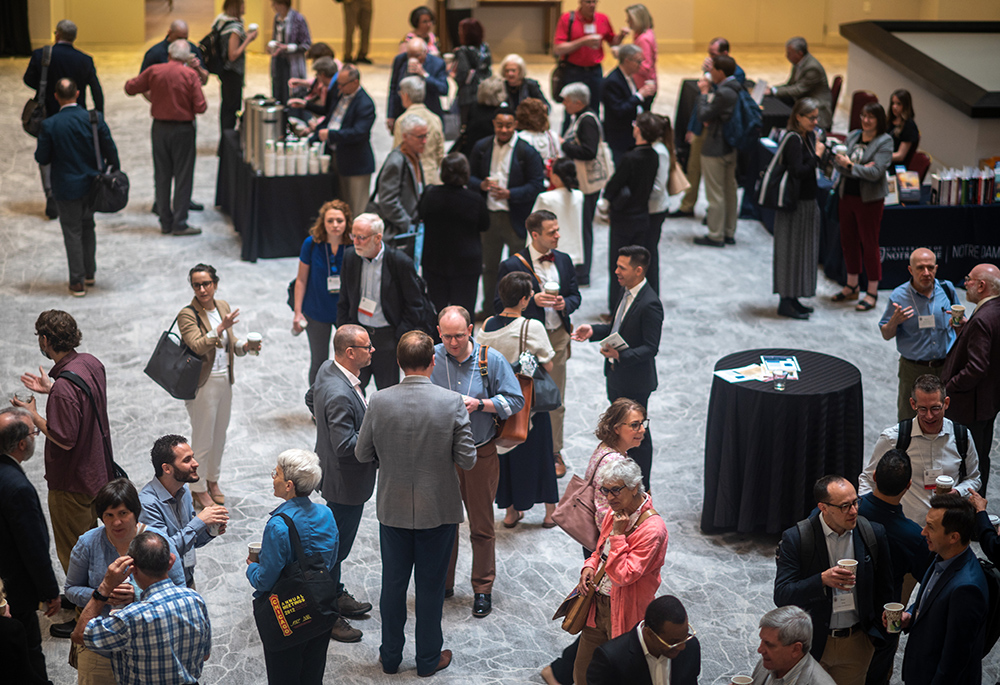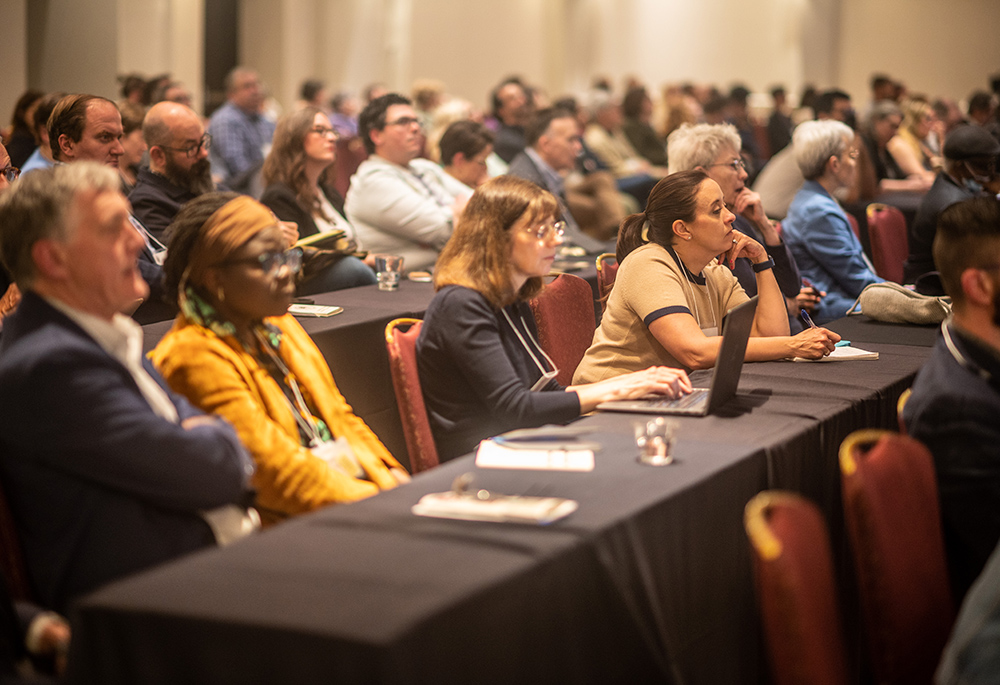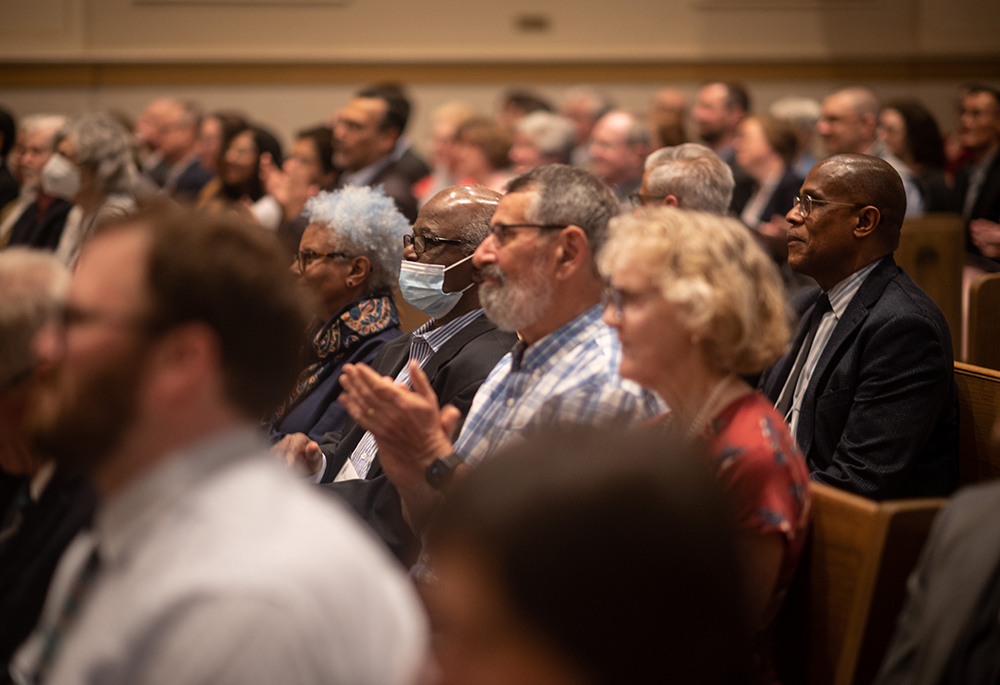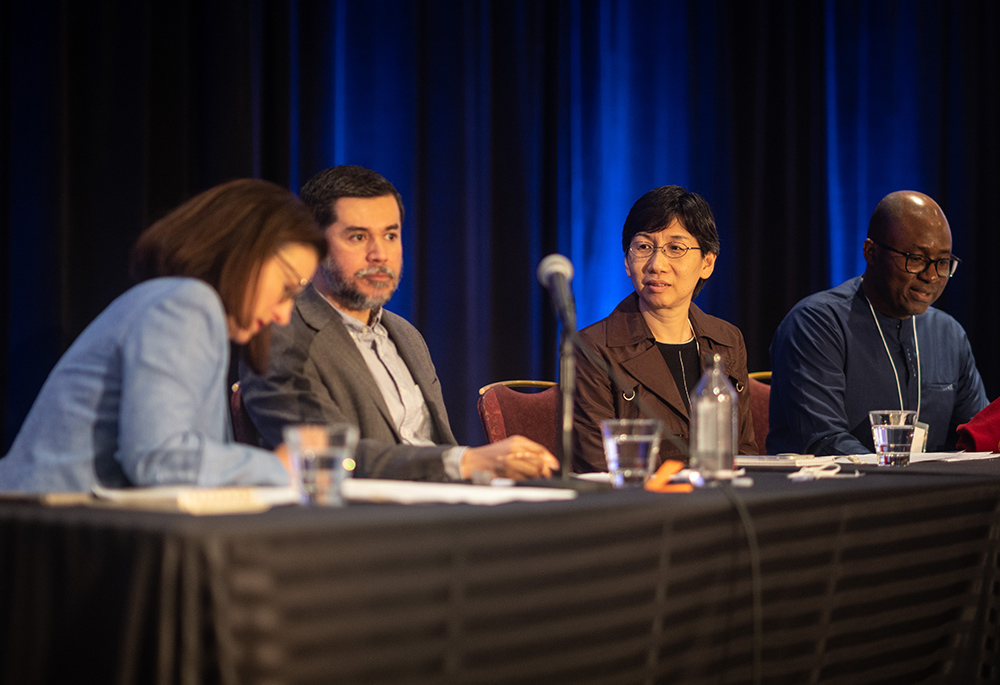
Members of the Catholic Theological Society of America mingle in the exhibit area during the June 8-11 convention in Milwaukee. (Courtesy of Catholic Theological Society of America/Paul Schutz)
An undercurrent of anxiety permeated the annual convention of the Catholic Theological Society of America, or CTSA, June 8-11 in Milwaukee, where attendees could not ignore the reality of financial threats to theological departments and faculty, especially at small Catholic liberal arts institutions throughout the country.
Just a few miles up the interstate and three weeks earlier, Cardinal Stritch University held its final commencement after 85 years. In April, just six weeks before the end of the semester, the university's president announced that the Franciscan school would be closing. In Oakland, California, the 154-year-old Holy Names University is also shutting its doors this year, citing financial woes.
Other Catholic schools are eliminating theology and religion majors — and faculty — as part of an overall decline in course offerings in the humanities. And a major credit ratings company has described the higher education sector as "deteriorating," due to rising costs and sluggish enrollment.
The ominous threat to theologians' work and employment was addressed directly in the CTSA president's address, and came up during the business meeting and a special Saturday evening session about the future of the society. It also was the topic of conversation in workshops, hallways and the hotel bar among the more than 350 attendees.

Attendees at the Catholic Theological Society of America convention listen during a plenary session. The society met June 8-11 in Milwaukee. (Courtesy of Catholic Theological Society of America/Paul Schutz)
At the business meeting, members approved a resolution to strongly encourage the board to institute measures, such as free or reduced membership or conference fees, for theologians harmed by program or institutional closures.
"These circumstances seriously injure the worker dignity of the affected faculty and their right to stable and sufficient employment, as well as harming the students of the programs and institutions which are abruptly closed, usually without meaningful consultation with faculty, students and other institutional stakeholders," said the resolution, which passed nearly unanimously.
In his outgoing presidential address, Jesuit Fr. Francis X. Clooney of Harvard Divinity School posed questions about the future: "Where is theology going to be on our campuses? How are we going to be theologians on our campuses?"
Clooney traced what he saw as three eras of the 77-year-old Catholic Theological Society of America: In the beginning, during the "seminary era," all its members were clerics, until the 1960s when lay men and women were admitted. What followed was a "golden era" of symbiosis between colleges and universities and the professional society.
"That era is, in a sense, over with," Clooney said, adding that the CTSA is entering a third era, which should proceed "without nostalgia for the first or the second." It is both "exciting and terrifying" to imagine what this third era will be like, he said.
Clooney said this new era could include a different structure or governance for the organization, more virtual events and more interconnectedness with other theological societies, such as the College Theology Society, or CTS, the Academy of Catholic Hispanic Theologians of the United States, or ACHTUS, the Black Catholic Theological Symposium, or BCTS, as well as more conservative groups of Catholic scholars.

Members of the Catholic Theological Society of America attend Mass at Old St. Mary Parish in Milwaukee during the group’s June 8-11 convention. (Courtesy of Catholic Theological Society of America/Paul Schutz)
New ways of doing theology
At the College Theology Society's annual convention June 1-4 at Sacred Heart University in Fairfield, Connecticut, outgoing president Brian Flanagan also cautioned against despair or nostalgia during what he sees as a time of transition for the profession.
"Theology as many of us have known it is dying," Flanagan said in his presidential address. "We live in a very different world than that of the founders of the CTS in 1954, and even in a different world for those of us who have only been present for the past few decades."
CTS was created for scholars who "only" taught undergraduate religion, at a time when the CTSA was limited to theologians — all clerics — who taught in seminaries.
Gone are the days when "students routinely took three, four or more courses in religion just to graduate and when theologians were not just needed but valued," said Flanagan of Marymount University in Arlington, Virginia, which recently cut nine majors, including theology.
Flanagan described an "increasingly precarious professoriate," and "dramatic weakening of Catholic and other religious identities in our institutions as administrations and boards of trustees pursue in an increasingly corporatized and increasingly desperate competition for customers — sorry, students."
Yet, he suggested, the way forward with the "task of imagining new ways of doing theology" could be aided by drawing upon the virtue of humility and the support of community.
Flanagan urged "scholars who look like me or those of us with tenure or chairs or wide platforms to use what remaining power we have not in a futile quest to maintain the fragile status that we have, but to empower the voices of those we most need to hear in our church and our world in this time of change."
Advertisement
The Hispanic theologians group, ACHTUS, held its June 4-7 colloquium in New Orleans this year, with the theme of "Empire." But the "con junto" conversations also raised broader issues about the role of theologians, Hispanic participation in synodality and leadership in the church, and the broader pressures facing higher education.
Incoming president Ramón Luzárraga told NCR in an interview after the ACHTUS gathering that attendees discussed the pressure that younger scholars face in finding stable work, especially in academia today, but noted that Hispanic theologians face additional challenges.
Although the number of Hispanic theologians is growing, "in the U.S. Hispanic theology doesn't sell," he said. "If that is your core expertise, you have to be an expert in other things in order to be hirable at a university."
The association is also challenged by growth of what used to be a smaller, tight-knit community, Luzárraga said. Nearly 50 scholars attended its colloquium this year. "The challenge is to maintain that community as we get bigger and more disparate," he said.
The Black Catholic Theological Symposium will meet in October, in Atlanta.
Synodality and other issues
A number of theologians attending the CTSA, CTS and ACHTUS meetings had participated in listening sessions with U.S. bishops in late May and early June as part of the ongoing three-year synod process.
Luzárraga of ACHTUS noted that "Hispanics are synodal by nature," but that Hispanics' expertise in synodality "has not translated to leadership roles" in the church.
"There is a talent pool out there and it's not being tapped," he said. "Lay theologians, whether liberal or conservative, are on the margins."
This differs from Latin America and the Caribbean, where "theologians are always in the thick of church conversations," Luzárraga said.
"This ties to a larger issue," he said. "When I see theology programs dying on the vine, they have one thing in common: They have no relationship to the local church. This is due to alienation between the academy and the Catholic Church, to anti-intellectualism and to radical subjectivism."
At the CTSA, there was a special session on synodality, and Pope Francis' new vision of synodality was brought up in most sessions, said incoming president Kristin Heyer of Boston College.
"The approach in a lot of these presentations is reflective of synodal conversations, because they involve listening to the peripheries and to the signs of the times," she told NCR.

CTSA President-elect Kristin Heyer (far left) presided over a globally themed plenary session at the society’s convention, featuring panelists (from left) Leo Guardado of Fordham University, Mary Mee-Yin Yuen of Holy Spirit Seminary College of Theology and Philosophy, and Stan Chu Ilo of DePaul University. (Courtesy of Catholic Theological Society of America/Paul Schutz)
Heyer, who participated in the theologians' synodal listening sessions, also believes that theologians will continue to engage with the synod throughout the three-year-long process.
At the Saturday evening session on the future of the CTSA, one recommendation from the small-group discussion was for theologians to connect more explicitly with the church and the world, Heyer said. "There was a desire to bridge not just with ecclesial structures and leadership but with people in the pews."
In addition to passing the resolution to urge the board to support members affected by closures and cutbacks, the CTSA membership also voted to raise dues on higher-salaried members. Having previously voted to divest the society's investments from fossil fuels, the membership this year voted to approve the implementation of divestment, by moving their portfolio to Aperio Group, which also offers positive screening for Catholic values.
At its convention, the College Theology Society board released a statement on gun violence, denouncing the "culture of death" and "false narrative that the solution to gun violence is more guns and more violence, fueling the industry of gun manufacturing and sales, as well as the gun lobby that so often dominates American political life."
The statement called upon the society and its members to study gun violence, especially its impact on communities of color; to facilitate lectures and public events on gun violence; and to dedicate significant portions of future conventions on the topic.
"Silence and indifference are not options," the statement said. "We must speak and act, denouncing social and ideological forces that fuel gun violence and diminish human life, and announcing a radical message of peace."








